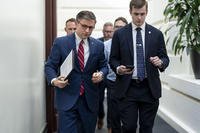Defense Secretary Ashton Carter urged the high-tech community Tuesday not to let the current battle between Apple and the FBI over unlocking an iPhone used by one of the San Bernadino attackers to get in the way of greater cooperation with the military.
In a speech to the Commonwealth Club of San Francisco ahead of a round of meetings with Silicon Valley firms, Carter also warned of China’s role as a “spoiler” in efforts to create a “Great Firewall” in cyberspace to constrict freedom of commerce and the Internet.
“There are limits on what I can say about the case” involving encryption in which the FBI was demanding that Apple build software to break into an iPhone that was used by one of the shooters in the San Bernadino, California, attacks in December that killed 14 people, the secretary said.
However, “it’s important to take a step back here, because future policy shouldn’t be driven by any one particular case," he added. "Second, encryption is a necessary part of data security, and strong encryption is a good thing.
“The bottom line is that the tech community and policymakers need to work together to solve these complex challenges, just as we have in the past,” Carter said. “The right way is partnership."
The secretary is seeking more partnerships between the Defense Department and information technology firms on a week-long West Coast swing.
Of the need to balance the right of privacy against national security, Carter said, “It is easy to see wrong ways to do this. One would be a law hastily written in anger or grief. Another would be to have the rules be written by Russia or China."
Carter then singled out China for posing a threat to global information networks.
“We’ve seen that China aims to, as one news headline put it last year, 'rewrite the rules of the global Internet,' limiting the access their 1 billion-plus citizens have to an open society," he said. “China has also indicated its intent to require backdoors for all new technologies — potentially forcing the world to operate, and innovate, on China’s terms. That’s not right."
The Apple-FBI fight on Tuesday went to Capitol Hill, where Apple’s general counsel and FBI Director James Comey detailed their opposing views to the House Judiciary Committee.
Bruce Sewell, Apple’s general counsel, said that the FBI's demand “would set a dangerous precedent for government intrusion on the privacy and safety of its citizens.”
Comey, meanwhile, warned of the risk to public safety if Apple and other firms were allowed to ignore court-ordered warrants. He posed the question: “If there are warrant proof spaces in American life, what does that mean and what are the costs of that?”









